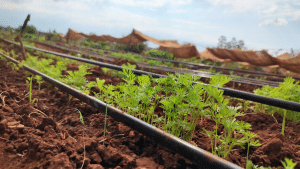
It’s not just about avoiding harmful chemicals; it’s about creating a harmonious ecosystem where plants, animals, and the environment thrive together. Organic Farming is a sustainable agricultural system that uses ecologically based pest controls and biological fertilisers derived largely from animal and plant wastes and nitrogen-fixing cover crops.
It’s a philosophy rooted in harmony with nature, sustainability, and environmental stewardship. At the heart of this philosophy lie several key characteristics that define organic farming, with companion planting being one of the major aspects of organic farming.
Characteristics of Organic Farming
- Chemical-Free Focus: Organic farming eliminates the use of synthetic fertilisers, pesticides, and herbicides, relying instead on natural methods like compost, crop rotation, and beneficial insects. This protects the environment, safeguards human health, and promotes biodiversity.
- Nurturing Soil Health: Organic farming prioritises soil health, recognising it as the foundation of a thriving ecosystem. Practices such as composting, crop rotation, and minimal tillage help build soil fertility, structure, and microbial diversity.
- Biodiversity: Organic farms have a variety of creatures, from earthworms to pollinators. This creates a balanced ecosystem where natural checks and balances keep pests in control.
- Sustainability: Organic farming practices are designed to be sustainable over the long term, preserving natural resources, minimising waste, and promoting ecological resilience.
- Companion Planting: Companion planting is a hallmark of organic farming, harnessing the power of plant partnerships to enhance growth, deter pests, and improve overall crop health.
- Rotational Cropping: Fields aren’t left bare after harvest. Rotating crops helps manage nutrients, prevent pests and diseases, and improve soil health. It’s like giving the land a diverse and delicious diet!
- Animal Welfare Matters: We treat our animals with respect, providing them with spacious living areas, access to natural light and fresh air, and organic feed. This translates to healthier animals, ethically sourced products, and a more sustainable food system.
- Natural Pest Management: Employing biological and mechanical methods to control pests and diseases, minimizing the need for intervention.
The Power of Companion Planting
Companion planting is the practice of growing different plant species together in proximity, to enhance growth, deter pests, and lead to higher yields. A prime example of how organic farming harnesses natural processes to create a thriving, sustainable environment. At Ambokili Farm, companion planting is a strategy and a fundamental aspect of our organic farming approach.
Benefits of Companion Planting:
- Pest Control: Certain plant combinations have natural pest-repelling properties, helping to protect crops from common farm pests. Garlic and onion, for example, are renowned for their ability to deter aphids, nematodes, and other insect pests. By interplanting these aromatic alliums with susceptible crops like tomatoes or lettuce, we create a natural barrier that wards off pests without the need for chemical pesticides.
- Soil Enhancement: Companion planting can also improve soil health by enhancing nutrient uptake, promoting beneficial microbial activity, and reducing soil erosion. Legumes like beans and peas, for instance, have nitrogen-fixing nodules on their roots that enrich the soil with nitrogen, benefiting neighbouring plants such as maize/corn or squash.
- Space Optimisation: By carefully selecting companion plants that complement each other in terms of growth habits, nutrient needs, and physical structure, we can maximise the productive use of space in our fields and gardens. Tall, sun-loving plants like maize/corn provide shade and support for trailing crops like beans or cucumbers, while ground cover plants like clover help suppress weeds and retain soil moisture.
- Pollinator Paradise: Flowering plants attract beneficial insects like bees and butterflies, ensuring efficient pollination and a thriving ecosystem.
Examples of Successful Companion Planting
- Tomatoes and Basil with Garlic: This classic culinary trio also thrives together in the garden. Garlic repels spider mites and tomato worms, while basil wards off aphids, thrips, tomato hornworms and flies, creating a protective and aromatic environment for tomatoes to flourish.
- Garlic and Onions with Leafy Greens: Placing garlic and onions near spinach, lettuce, or kale helps repel slugs and other leaf-eating pests, safeguarding the tender leaves of these greens.
- Carrots and Onions: The strong scent of onions masks the aroma of carrots, protecting them from root fly. This pairing is a prime example of how companion planting can reduce the need for pest control measures.
- Carrots and Radishes: Interplanting carrots with radishes can help deter carrot flies, as the strong aroma of radishes confuses and repels these pests.
- Cucumbers and Nasturtiums: Nasturtiums act as a natural trap crop for aphids, attracting these pests away from cucumber vines and providing a sacrificial food source.
The Impact of Companion Planting on Organic Farms
Implementing companion planting on a broad scale, as we do at Ambokili Farm, transforms our fields into a mosaic of interdependent life. This practice not only enhances the health and yield of our crops but also contributes to the biodiversity that is vital for a resilient farming ecosystem. By fostering these natural relationships, we reduce our reliance on external inputs, making our farm a self-sustaining haven for life.
Conclusion:
Companion planting, especially the strategic use of garlic and onions alongside other crops, embodies the ingenuity and respect for nature that organic farming champions. By embracing the principles of organic farming practices, we honour the inherent balance of ecosystems and nurture a sustainable future for generations to come. At Ambokili Farm, we are proud to practice and promote these methods, demonstrating that agriculture can be productive, sustainable, and in harmony with the environment.
We encourage you to learn more and explore how these practices can benefit your own garden or support organic farms like ours.
Subscribe to our newsletter for expert tips, insights, and inspiration on organic farming.






